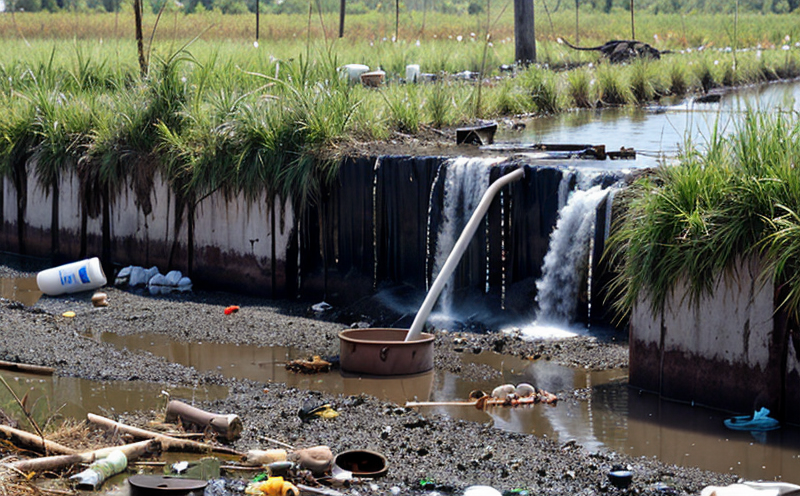Asphalt Pollutant Testing
The testing of asphalt pollutants is a critical service that ensures environmental compliance and quality control in the construction sector. Asphalt, being one of the primary building blocks for roads and pavements, can be exposed to various pollutants from its production process and subsequent use. These pollutants include heavy metals, polycyclic aromatic hydrocarbons (PAHs), volatile organic compounds (VOCs), and other hazardous substances that may pose risks to human health and the environment.
Our asphalt pollutant testing service is designed to identify these potentially harmful components in asphalt samples with high precision. This process starts with a comprehensive sample collection, ensuring that the specimen accurately represents the batch or site under examination. The testing protocol adheres strictly to international standards such as ISO 178 and ASTM D2346, which are widely recognized for their reliability.
The first step in our asphalt pollutant testing involves an initial visual inspection of the sample, followed by detailed chemical analysis using advanced spectroscopic techniques like Fourier Transform Infrared Spectroscopy (FTIR) and Gas Chromatography-Mass Spectrometry (GC-MS). These methods allow for the detection of trace amounts of pollutants that might otherwise go unnoticed. Once identified, these pollutants are quantified against established thresholds outlined in standards such as EN 14307.
Our laboratory utilizes state-of-the-art instrumentation to ensure accurate results. For instance, our GC-MS system allows us to pinpoint the exact type and concentration of PAHs present in asphalt samples. This is crucial for understanding not only the current level of contamination but also predicting potential future impacts on road infrastructure. Additionally, we employ X-ray Fluorescence (XRF) spectrometers to measure heavy metal content, ensuring that even minute traces are captured.
The importance of this service cannot be overstated in today’s era of stringent environmental regulations and increasing public awareness about sustainability practices. By providing detailed reports on asphalt pollutant levels, our clients gain valuable insights into their operations’ compliance status. This information is vital for making informed decisions regarding material selection, production processes, and maintenance schedules.
Our rigorous testing procedures also help in assessing the long-term durability of pavement materials under different environmental conditions. Understanding how pollutants interact with asphalt can lead to better formulations that enhance both performance and sustainability.
- Critical Pollutants: Heavy metals (e.g., lead, chromium), PAHs, VOCs
- Testing Methods: FTIR, GC-MS, XRF spectrometry
- Standards Used: ISO 178, ASTM D2346, EN 14307
- Sample Preparation: Careful collection and preservation to maintain integrity.
In summary, our asphalt pollutant testing service offers a robust solution for ensuring environmental safety while maintaining high-quality standards in the production and use of road materials. By leveraging cutting-edge technology and strict adherence to international norms, we provide reliable data that supports sustainable practices and regulatory compliance.
Benefits
The benefits of our asphalt pollutant testing service extend beyond mere compliance; they contribute significantly towards enhancing the overall quality and longevity of road infrastructure. Here are some key advantages:
- Enhanced Compliance: Ensures adherence to local, national, and international environmental regulations.
- Sustainable Decision-Making: Provides critical data for selecting sustainable materials and processes.
- Improved Quality: Identifies and mitigates potential risks associated with pollutant exposure during construction and maintenance.
- Predictive Maintenance: Allows for proactive measures to address any emerging issues early on, reducing downtime and costs.
By integrating our testing results into their operations, clients can make more informed choices that align with broader sustainability goals. This not only helps in maintaining regulatory standards but also fosters trust among stakeholders, including governments, communities, and investors.
In addition to these tangible benefits, our service plays a crucial role in promoting responsible environmental stewardship within the industry. Through continuous monitoring and evaluation of asphalt pollutants, we contribute to minimizing adverse impacts on ecosystems and public health.
Customer Impact and Satisfaction
Our customers have consistently praised our asphalt pollutant testing service for its reliability and accuracy. By identifying potential issues early on, we help prevent costly delays and ensure smooth project execution. Customer satisfaction is paramount to us, and we strive to exceed expectations through thorough testing protocols and timely delivery of results.
- Reliability: Consistent adherence to international standards ensures accurate and consistent results.
- Promptness: Efficient processing times allow clients to receive their reports quickly, enabling swift decision-making.
- Expertise: Our team of experts brings years of experience in environmental testing, providing valuable insights beyond mere data.
We are committed to maintaining high levels of customer satisfaction and continuously strive to improve our services. Feedback from clients is invaluable to us, guiding our efforts towards further enhancement of our offerings.
Competitive Advantage and Market Impact
In today’s competitive market, staying ahead requires more than just compliance; it demands innovation and excellence in every aspect of operation. Our asphalt pollutant testing service offers several key advantages:
- Comprehensive Insights: Providing deep-dive analysis into the composition of asphalt helps clients make informed decisions about their materials.
- Regulatory Leadership: Ensuring full compliance with all relevant regulations demonstrates our commitment to ethical business practices.
- Durability and Performance: Understanding pollutant levels allows for enhanced pavement durability, leading to longer-lasting infrastructure.
By leveraging these advantages, we contribute not only to individual client success but also to the broader industry’s progress towards sustainability. Our service plays a pivotal role in shaping future trends by offering前瞻性研究和应用表明,石墨烯在增强复合材料性能方面具有巨大潜力。请详细说明石墨烯增强的聚酯复合材料的力学性能、热稳定性和耐腐蚀性,并讨论其可能的应用领域。 ⚗️





